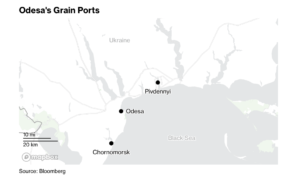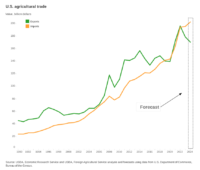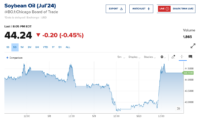Bloomberg's Clarice Couto reported this past Friday that "a surprising tax change in agriculture powerhouse Brazil has the potential to make soy grown in the world’s largest bean exporter less…
Wheat Climbs Following Russian Strike on Odesa
Gloria Li reported today at The Financial Times Online that, “Wheat prices climbed on Wednesday, after Russian attacks on food infrastructure in Ukraine raised concerns over the potential impact on supply from the world’s fifth-largest wheat exporter.
“Chicago wheat futures rose as much as 1 per cent to a high of $5.88-3/4 per bushel, the highest level since November 16.
Russian forces on Tuesday evening hit port infrastructure in the southern city of Odesa that is critical to Ukraine’s grain exports, the regional governor said.
And Reuters writer Naveen Thukral reported today that, “Chicago wheat rose 1% on Wednesday, with the market climbing to its highest in nearly two weeks on renewed concerns over Ukrainian supplies after Russian attacks on grain infrastructure.”
The article stated that, “Russian forces hit port infrastructure in Ukraine’s southern city of Odesa on Tuesday evening, the regional governor said.”

Meanwhile, Reuters writer Michelle Nichols reported yesterday that, “The United Nations World Food Programme (WFP) warned on Tuesday that Ukraine’s wheat production may be unable to meet domestic and export demand in the years to come if Black Sea export routes remain blocked and attacks on food infrastructure continue.
“WFP’s Ukraine director, Matthew Hollingworth, said a forthcoming report by the U.N. Human Rights Office (OHCHR) would show that since mid-July there have been 31 documented attacks on Ukraine’s grain production and export facilities.
“He told the U.N. Security Council that ‘28 of these attacks were in Odesa oblast alone, which is home of the vital Black Sea and Danube River terminals essential for global trade.'”
Nichols pointed out that, “Ukraine launched what it calls a temporary export corridor in August to allow agricultural exports as an alternative arrangement. More than 700,000 metric tons of grain have left Ukrainian ports via the new route.”
Also with respect to the Black Sea, Bloomberg writers Selcan Hacaoglu, Slav Okov, and Andra Timu reported earlier this week that, “NATO members Turkey, Romania and Bulgaria are nearing an agreement to create a joint force to clear mines drifting into their parts of the Black Sea as part of the fallout from Russia’s invasion of Ukraine.
We stand for a secure, prosperous, and interconnected Black Sea Region, values more important than ever in the face of Russia’s aggression against Ukraine. @UnderSecPD shares how the Black Sea is critical for our @NATO Allies and the world, from the port of Varna in Bulgaria. pic.twitter.com/N61RXbG6Xa
— Department of State (@StateDept) November 18, 2023
“Deputy defense ministers from the three nations are set to meet in Ankara on Wednesday to try to finalize the details of the unit to clear the sea mines, according to three people familiar with the matter, asking not to be identified because the information isn’t public. It’s unclear whether a final accord will also be signed after the two-day meeting, one of the people said.”
Also this week, Reuters writer Pavel Polityuk reported that, “Ukrainian farmers have almost completed winter crop sowing, seeding about 5.8 million hectares as of Nov. 20, the agriculture ministry said on Tuesday.
“The area included 4.02 million hectares of winter wheat, or 92.3% of the expected area, the ministry statement said.”
The article noted that, “Ukraine is expected to harvest 79 million tons of grain and oilseed in 2023, with a 2023/24 exportable surplus of about 50 million tons, the ministry has said.”







